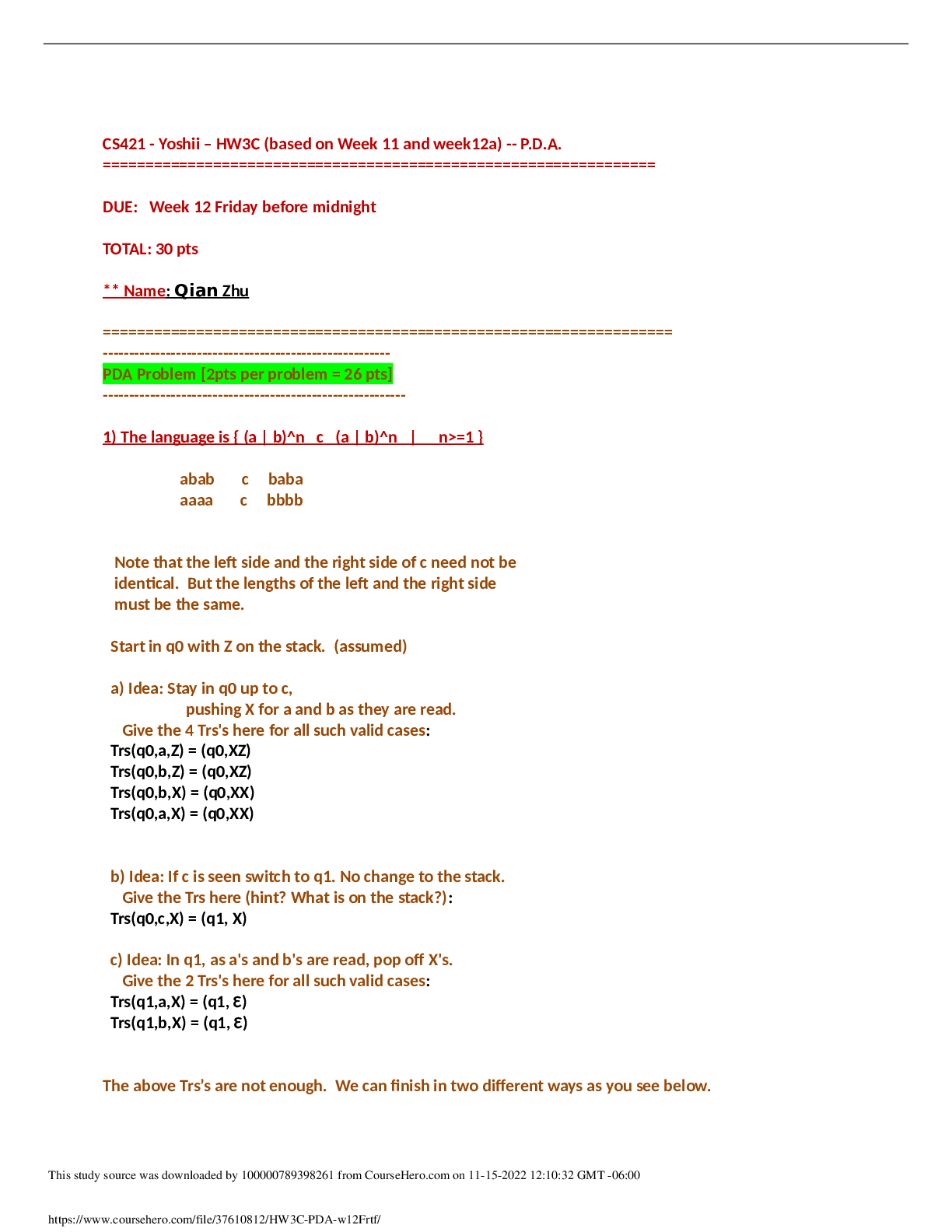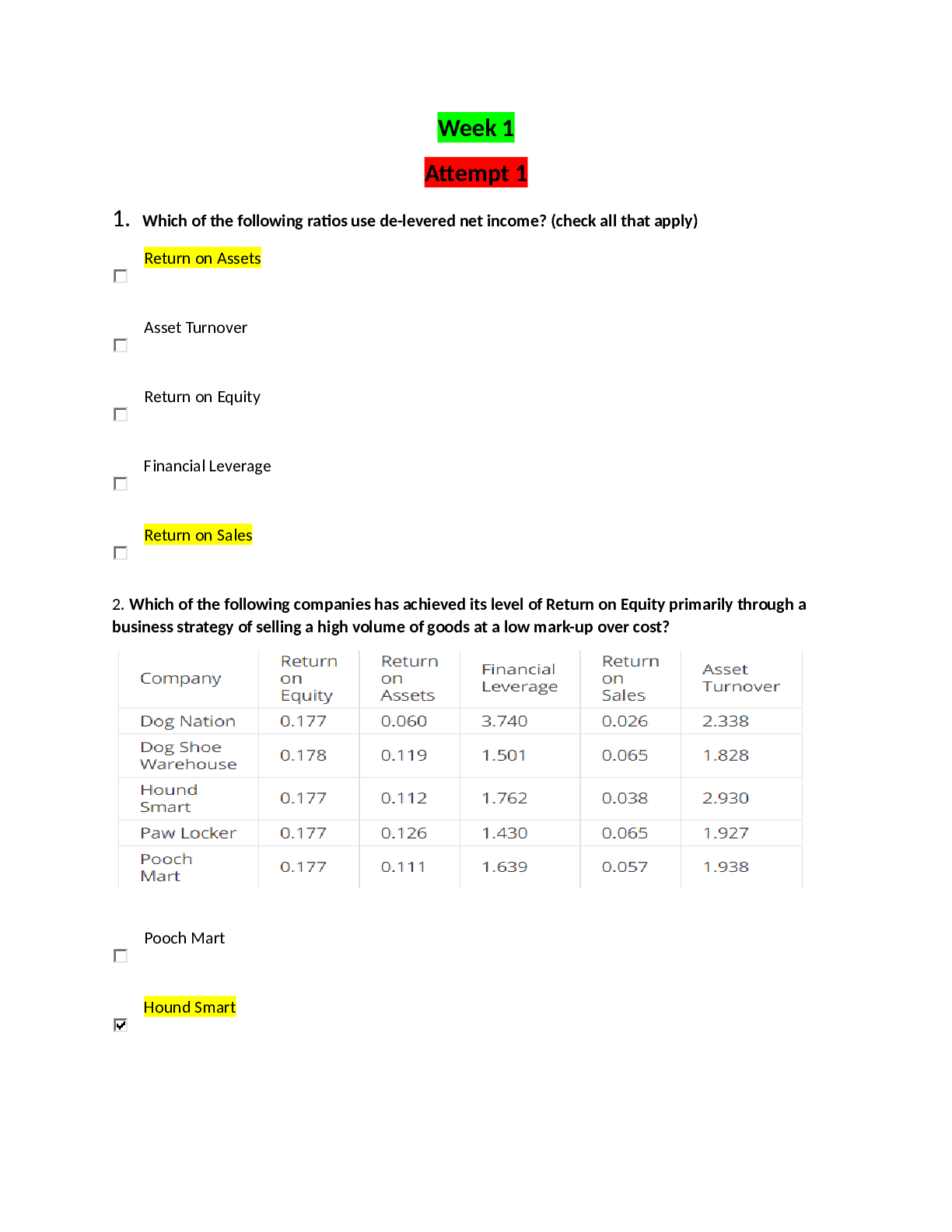Communication > QUESTIONS & ANSWERS > MGB225 INTERCULTURAL COMMUNICATION & NEGOTIATION Week 7 Tutorial (All)
MGB225 INTERCULTURAL COMMUNICATION & NEGOTIATION Week 7 Tutorial
Document Content and Description Below
TutorialTutorial 7 content 2 Reflective writing workshop Assessments 2 & 3What is reflective thinking? Reflecting is like observing, remembering and re-running your own actions after something has... occurred. It is your personal response to something which may include: • why it happened • how it happened • whether it was successful or not • how you might do it differently in the future or what you learnt from it Why reflect? It is helpful to: • analyse your learning experiences to make meaning from them, to learn from ‘mistakes’ and to identify what you still need to know • make links between theory and practice • integrate new knowledge with prior learning • understand how your personal beliefs, attitudes and assumptions underpin your responses to situations 3The basis of your thinking You need to think not only about what happened in the given situation but also: • What are your personal beliefs, values, attitudes and assumptions? • How do these shape your response to the situation? • Based on these responses, what were you expecting to happen? 4How to approach a reflective assignment It can be quite a challenge to think reflectively and even more of a challenge to write reflectively. The first step is to think about what happened in the given situation. Then you will need to evaluate why things happened as they did and what you learnt from the experience. 5How to complete reflective writing 1. You need to describe what happened, but more importantly, to demonstrate what you have learned from a particular experience. 2. It is helpful to ask yourself the following relevant questions and record your responses: • Why did X happen? What did I do in X situation? What were the positive and negative outcomes in the situation? How might I do things differently next time? What did I expect to happen? What have I learned and how does this knowledge contribute to my development? 6The language of reflective writing • The language of reflective writing is somewhat different to standard academic writing. It is acceptable to use the first person (I, me, my, we) and so on as this makes sense when writing about your personal experiences. • The tone of the writing is more informal than academic writing as you are almost ‘having a conversation with yourself’ when you write. However, avoid being too ‘chatty’. • Always write in complete sentences in clear language. • Make sure that you evaluate your experiences and do not just describe them. Use examples to make your point, refer to the academic literature, and use appropriate discipline terminology. 7Incorporating research to support your arguments Assume you have taken part in a role-playing exercise to simulate a board meeting. Afterwards you are asked to reflect on your experiences. • Do some research about board meetings (e.g. about the best way to conduct a board meeting or how to deal with interruptions during a board meeting). You should now compare this scholarly evidence with your personal experiences in the exercise. If what happened in the exercise did not match the evidence then you should write why you think the situation played out differently. Also, include how research helps to inform what you reflect upon. 89 Analysis of a piece of reflective writing In our team, we experienced great difficulty in the ‘storming’ stage (Tuckman, 1965). I had expected that everyone would do what was needed without being asked. However, people wouldn’t turn up for meetings or wouldn’t do what they were asked to do. In the end, the team called a meeting and agreed that clear guidelines had to be written with instructions for each task that was allocated. We found in the next few weeks that this method reduced the amount of tension in the group, and we were able to refer to the written document to check that everyone did what was promised. I have learned from this experience that in a team situation, it is better to establish written guidelines for procedures and tasks from the beginning; if it is left until there are disagreements and tension, it is very hard to recover the spirit of goodwill in the team. You can see that the student has referred to research (Tuckman’s model of team formation, particularly the storming stage) (Tuckman, 1965), and he/she analysed their own experiences, including their expectations of team work. There are several sentences of reflection on: • what the issue was (people would not turn up for meetings) • what was done about it (a team meeting was called with agreement reached on guidelines for the project tasks) • how the new strategy improved the situation. The final sentence explains what the student learnt from the experience and how they would do things better in the future.10 Working in your team, evaluate the following example, particularly identifying these key elements: • Student’s beliefs about the issue • Use of research • Reflections on what happened • What the student learnt Activity11 Example Last week’s lecture presented the idea that science is the most powerful form of evidence. My position as a student studying both physics and law makes this an important issue for me and one I was thinking about while watching the ‘The New Inventors’ television program last Tuesday. The two ‘inventors’ (an odd name considering that, as Smith (2002) says, nobody thinks of things in a vacuum) were accompanied by marketing representatives. The conversation seemed quite contrived, but also was funny and enlightening. I realised that the marketing people used a certain form of evidence to persuade viewers like myself of the value of the inventions. To them, this value was determined solely by whether something could be bought or sold—in other words, whether something was ‘marketable’. In contrast, the inventors seemed quite shy and reluctant to use anything more than technical language, as if this was the only evidence required and no further explanation was needed. This difference in their behaviours forced me to reflect on the aims of this course—how communication skills are not generic, but differ according to time and place.12 Analysis of components Last week’s lecture presented the idea that science is the most powerful form of evidence. My position as a student studying both physics and law makes this an important issue for me and one I was thinking about while watching the ‘The New Inventors’ television program last Tuesday. The two ‘inventors’ (an odd name considering that, as Smith (2002) says, nobody thinks of things in a vacuum) were accompanied by marketing representatives. The conversation seemed quite contrived, but also was funny and enlightening. I realised that the marketing people used a certain form of evidence to persuade viewers like myself of the value of the inventions. To them, this value was determined solely by whether something could be bought or sold—in other words, whether something was ‘marketable’. In contrast, the inventors seemed quite shy and reluctant to use anything more than technical language, as if this was the only evidence required and no further explanation was needed. This difference in their behaviours forced me to reflect on the aims of this course—how communication skills are not generic, but differ according to time and place. Student’s beliefs about the issue Use of research Reflections on what happened What the student learnt13 Next week • Tutorial: Negotiation Simulation 3 (Assessed) • 1st mandatory Group Planning Form needs to be submitted14 References Tuckman, B. W. (1965). Developmental sequence in small groups. Psychological Bulletin, 63(6), 384. Keates, C. (2018, July 18). Tips on how to write a Reflection. Retrieved from https://www.youtube.com/watch?v=TyTrg37kfpQ&feature=youtu.be [Show More]
Last updated: 2 years ago
Preview 1 out of 14 pages

Buy this document to get the full access instantly
Instant Download Access after purchase
Buy NowInstant download
We Accept:

Reviews( 0 )
$3.00
Can't find what you want? Try our AI powered Search
Document information
Connected school, study & course
About the document
Uploaded On
Feb 02, 2020
Number of pages
14
Written in
Additional information
This document has been written for:
Uploaded
Feb 02, 2020
Downloads
0
Views
81






.png)
.png)
.png)
.png)
.png)
.png)
.png)

